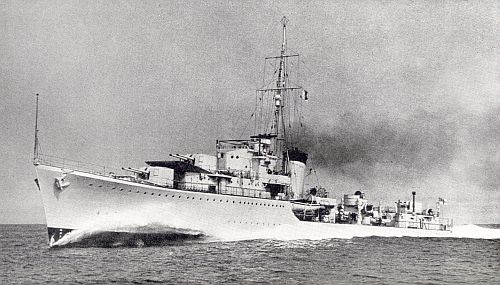- Author
- Wright, Ken
- Subjects
- Ship histories and stories, WWII operations, History - WW2
- Tags
-
- RAN Ships
- None noted.
- Publication
- December 2008 edition of the Naval Historical Review (all rights reserved)
When Hitler declared war on Great Britain in 1939, here in Australia, the Prime Minister Robert Menzies addressed the nation on 3 September:
‘Fellow Australians, it is my melancholy duty to inform you officially, that in consequence of a persistence by Germany in her invasion of Poland, Great Britain has declared war upon her and that as a result, Australia is also at war.’
War service would take Australians to virtually every corner of the world. Nearly one million served in the Navy, Army, Air Force or Merchant Marine (otherwise known as the Merchant Navy).
With Australia’s declaration of war on Germany, the British Admiralty accepted an offer by the Australian Naval Board to provide volunteer personnel to serve with the Royal Navy. Five hundred volunteers of the Royal Australian Naval Volunteer Reserve [RANVR], sometimes referred to as the ‘Yachtsman Scheme’, arrived in England in early 1940 and the Royal Navy welcomed them at this most critical time in British history and of the world.
Their training began at HMS Collingwood at Portsmouth prior to three months ‘sea time’ experience. Potential officers then began an additional three month intensive course at HMS King Alfred training establishment, also at Portsmouth. They became first lieutenants and above although many spent the war as ratings. After the course the men were assigned, according to strategic requirements, to operational ships throughout the RN ranging from battleships to motor launches and in some cases, to submarines. They also became instructors on navigation or anti–submarine courses as well as gunnery and salvage work. During the six years of war King Alfred trained a total of 22,508 Royal Navy Volunteer Reserve Officers for active sea service. As well as the Australians, there were men from many Commonwealth and Allied countries including Canada, Belgium, China, Holland, New Zealand, Norway, South Africa and the United States.
The following few stories are a token representation of all those who served with the RANVR, and an illustration of the diversity of their placements throughout the Royal Navy.
HMS Kelly
On 23 May 1941, the destroyers HM Ships Kelly and Kashmir were steaming south down the coast of Crete when around 0800 twenty four Stukas from General Wolfram von Richtofen’s VIII Air Corps attacked the retreating destroyers. Kashmir was hit amidships by two bombs, her magazine exploded and she sank within two minutes. RANVR ordinary seaman Ian Rhodes managed to shoot down a Stuka just before Kashmir had to be abandoned. He survived the war and was awarded the Conspicuous Gallantry Medal for his action that day.

One Stuka came in lower than the rest over Kelly and released its bomb, hitting square on X gun-deck and killing the gun crew. Kelly’s gunners kept up a barrage of fire against the attacking aircraft but another bomb exploded right beside the Kelly tearing a gaping hole in her side near X magazine while she was still steaming at 30 knots. The destroyer lost stability and began rolling over at speed, eventually capsizing but still continuing its forward momentum. She finally stopped all movement and for a while floated upside down with the length of her keel from stem to stern exposed. The screws were still turning while several of her crew clung precariously to the keel. All around the mortally wounded ship were men struggling to survive in a sea covered in a thick stinking mixture of fuel oil and debris. Some were killed in the initial blast; some drowned when the Kelly capsized; some choked to death with their lungs full of oil or were killed when the Stukas returned to machine gun the struggling survivors. RANVR Bob Fenwick from Kashmir was clinging to an oar for support when Captain Mountbatten swam up to the other end to hold on. Mountbatten remembered Fenwick from a previous meeting and made a remark something like, ‘I suppose this is not affecting you too much. You Australians are all good swimmers’.




